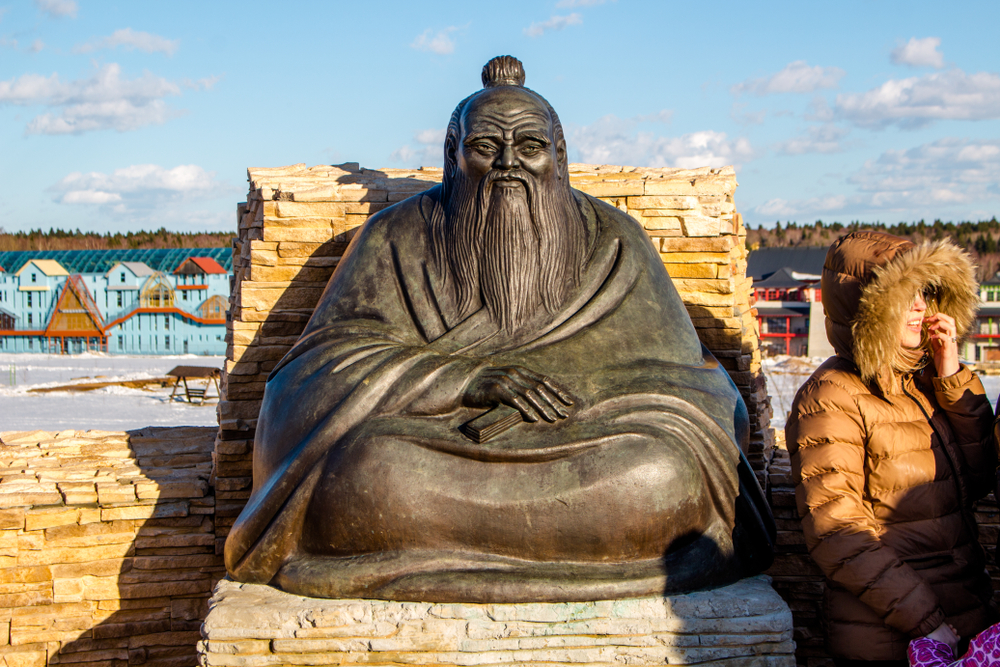Besides the Bible, no other work has as many translations as the Daodejing—the founding scriptural text of Daoism.
Lao Tzu (“the old master”) is the attributed author of the Daodejing and the founder of Daosim. Living in China during late 6th Century B.C., Lao Tzu witnessed never ending conflict between warring oriental kingdoms. Dismayed with all of the violence, oppression, and suffering he saw, Lao Tzu developed a religious body of thought that was highly anti-authoritarian, contemplative, and introspective, in order to get back to the proper and natural cosmological order – i.e., the Way (Dao).
The Dao can be described as eternal, infinite, natural, self-correcting, and non-aggressive. Humans follow the Dao (Way) by “not acting” (wu wei). This is not resignation – rather it is the reception of the Dao and letting it “act” through you. It is somewhat akin to the Protestant idea of God’s grace working in and through a person so they can follow His will, which they would not be able to do apart from it. Think of it like “being in the zone” in sports when a player is so in tune with what is going on that they accomplish something great without being forceful or overly conscious.
In their political and social applications, Daoism and its concept of wu wei are extremely laissez-faire. In fact, Ken McCormick at the University of Northern Iowa wrote “[l]aissez-faire is simply an extension of ‘wu wei’ to government policy.” Moreover, the notorious libertarian Murray Rothbard called Lao Tzu “[t]he first libertarian intellectual,” and elsewhere he stated that the early Daoists “believed in virtually no interference by the state in economy or society.”
As a proponent of wu wei and laissez-faire socio-political order, Lao Tzu was a sharp critic of government action, laws, regulation, and taxation:
In the kingdom the multiplication of prohibitive enactments increases the poverty of the people;
the more implements to add to their profit that the people
have, the greater disorder is there in the state and clan;the more acts of crafty dexterity that men possess, the more do strange
contrivances appear;the more display there is of legislation, the
more thieves and robbers there are…The people suffer from famine because of the multitude of taxes
consumed by their superiors. It is through this that they suffer
famine.The people are difficult to govern because of the (excessive)
agency of their superiors (in governing them). It is through this
that they are difficult to govern. – 57 & 75, Daodejing.
Additionally, being concerned with the well-being and peace of the land and its people, Lao Tzu was anti-war; only advocating for violence if it was of the utmost necessity:
He who would assist a lord of men in harmony with the Tao will
not assert his mastery in the kingdom by force of arms. Such a course
is sure to meet with its proper return.Wherever a host is stationed, briars and thorns spring up. In the
sequence of great armies there are sure to be bad years…Now arms, however beautiful, are instruments of evil omen,
hateful, it may be said, to all creatures. Therefore they who have
the Tao do not like to employ them.The superior man ordinarily considers the left hand the most
honourable place, but in time of war the right hand. Those sharp
weapons are instruments of evil omen, and not the instruments of the
superior man;–he uses them only on the compulsion of necessity. – 30-31, Daodejing
Instead of ruling by force, decree, and regulation to achieve societal order, Lao Tzu believed that individuals were self-regulating (or led by an “Invisible Hand”), when left alone by the state:
I will do nothing (of purpose), and the
people will be transformed of themselves; I will be fond of keeping
still, and the people will of themselves become correct. I will take
no trouble about it, and the people will of themselves become rich; I
will manifest no ambition, and the people will of themselves attain to
the primitive simplicity…The government that seems the most unwise,
Oft goodness to the people best supplies;
That which is meddling, touching everything,
Will work but ill, and disappointment bring. – 57-58, Daodejing
Lao Tzu, like Friedrich Hayek, believed that this “hands-off” approach spontaneously creates a more just and tolerable order. Both thought that human nature and knowledge was finite, and that trying to rule from a centralized place that in effect presumes (but does not have) infinite knowledge will inevitably lead to error, miscalculation, restriction, and tyranny. Instead, when we accept that we are finite and are “in tune” with the Dao or the natural order, we can then be content, know our limits, and allow others to thrive and be free.
Jesus taught us to “do unto others” to create moral relationships. Lao Tzu taught us to “Dao unto others” to create a harmonious social order.

